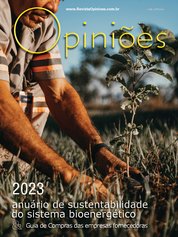Vicente Abate
Presidente da Associação Brasileira da Indústria Ferroviária
AsAA23
Agronegócio brasileiro inspira eficiência energética
O Brasil é considerado um dos países de maior relevância global no combate às mudanças climáticas, em função de sua matriz energética ser composta por mais de 85% de energias de fontes renováveis. Além disso, alinha-se positivamente aos 17 ODS – Objetivos de Desenvolvimento Sustentável da ONU – que abrangem diferentes temas, relacionados a aspectos ambientais e sociais, visando à Agenda 2030, coordenada pelas Nações Unidas, por meio do Programa das Nações Unidas para o Desenvolvimento – PNUD.
Em 1975, foi criado o Programa Nacional do Álcool, o Proálcool, uma iniciativa conjunta dos fabricantes de automóveis, governo e acadêmicos, resultando no que, mais tarde, viria a ser considerado o maior programa dedicado ao incentivo de biocombustíveis renováveis do mundo. Embora extinto anos depois, já consolidado, esse programa provocou a intensificação da produção de etanol, combustível de primordial importância para a descarbonização do transporte. Os benefícios do Proálcool foram permanentes: a melhoria nas condições ambientais e a maior flexibilidade na produção de açúcar. O programa ainda atuou de maneira significativa na geração de milhões de empregos e na manutenção da massa salarial.
Em 2016, o Ministério de Minas e Energia lançou o RenovaBio, que visava expandir a produção de biocombustíveis para gerar sustentabilidade ambiental, econômica e social, conceitos básicos do ESG (sigla do inglês para Environmental, Social and Governance, traduzido no português para Meio Ambiente, Social e Governança). Tais medidas governamentais deram o suporte para a produção de combustíveis alternativos, amigáveis ao meio ambiente.
Em 2023 é prevista uma robusta safra de grãos, em torno de 310 milhões de toneladas, 17% maior que em 2022. Já a safra de cana-de-açúcar (2023/2024) terá cerca de 630 milhões de toneladas a serem esmagadas, com a constatação, desde já, de uma excelente produtividade. Esses volumes têm-nos conduzido, há tempos, a um importante papel na transição energética global, de forma prioritariamente sustentável.
Além de alimentar nossa população e cerca de um bilhão de pessoas ao redor do mundo, os subprodutos dos grãos e da cana-de-açúcar permitem gerar energia renovável disruptiva, particularmente através do hidrogênio verde, a nova fronteira energética brasileira.
O etanol terá participação crucial na eletrólise do hidrogênio, cujo desenvolvimento será capitaneado pelas energias eólica e solar, que ganham participação crescente em nossa matriz energética. Assim como os grãos já têm contribuído na geração de biocombustíveis, chegamos ao franco desenvolvimento experimentado pelos sistemas de biomassa e de baterias.
A produção do hidrogênio, em suas variadas formas, já se torna realidade em alguns dos principais portos nacionais, como Pecém, Suape, Açu e Santos, cujo hidrogênio servirá também para abastecer nossas indústrias. Ademais, será inaugurada em breve, na Bahia, uma fábrica de eletrolisadores, para contribuir com o necessário desenvolvimento do setor.
A indústria ferroviária brasileira também está engajada nesse contexto. Um dos fabricantes nacionais de locomotivas entregou em 2020, no mercado interno, a primeira locomotiva de manobra 100% a bateria que já tem sido exportada para os EUA. Esse e outro fabricante nacional têm conduzido testes na Califórnia com locomotivas híbridas, de linha, com célula de hidrogênio.
Os fabricantes nacionais de trens de passageiros estão trazendo tecnologia de suas matrizes para replicar no Brasil o sucesso de Trens Regionais na Europa e VLT (Veículos Leves sobre Trilhos) na Coreia do Sul, movidos a hidrogênio.
Mesmo o vagão de carga tracionado pode contribuir com 3,5% de eficiência energética pela diminuição do coeficiente de arrasto, através da melhoria de sua aerodinâmica, comprovada por ensaios em túnel de vento.
Estou certo de que essas oportunidades, e outras que surgirão, farão com que o Brasil consolide, no curto e médio prazos, sua posição estratégica como produtor e fornecedor mundial de energias renováveis, alavancando toda a cadeia produtiva deste setor promissor.




